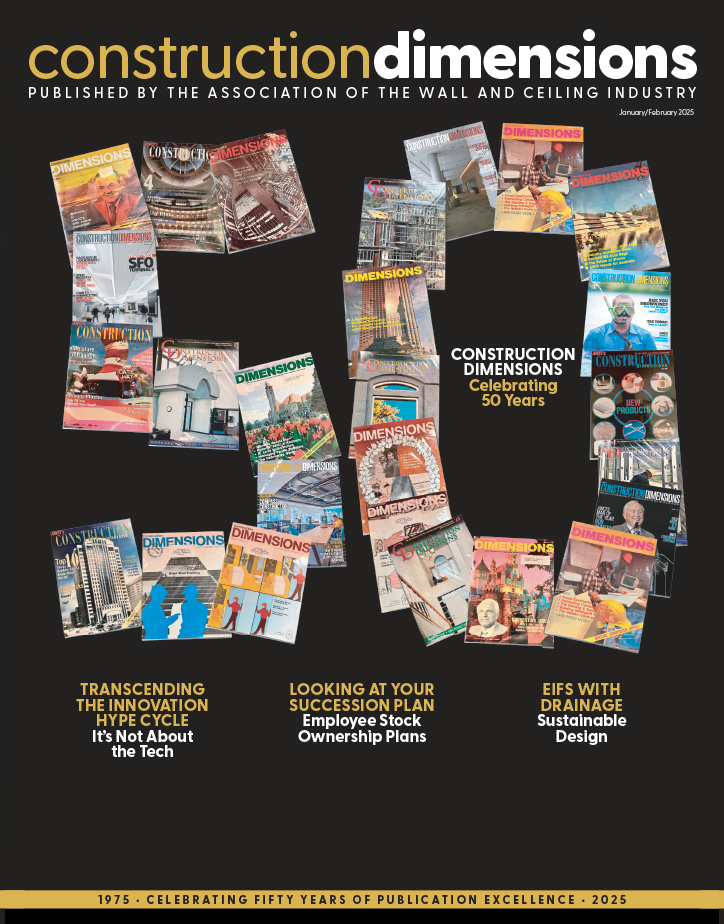George Bernard Shaw wrote that “the reasonable man adapts himself to the world; the unreasonable one persists in trying to adapt the world to himself. Therefore all progress depends on the unreasonable man.”
The movers and shakers of any industry (including ours) are a rare breed and therefore have a unique set of problems. They are visionaries, pioneers and consequently always pioneering their way in some certain and unwavering direction. Being such, they are difficult for the “reasonable” person to accept, understand or follow. They think and act differently. They seem unreasonable, because they are—not in the sense that they are intent on being difficult for difficulty’s sake, but rather because the path they choose is difficult and they fully understand one simple fact: It’s extremely hard to make things easy.
However, it is critical to take the hard road in the present in order to make things easier and better in the future. They are willing to pay the price for progress both monetarily and sacrificially. They do so in order to effect the change they intend and achieve whatever particular vision they are fixated on at any given time. They are rarely satisfied, and in a certain sense never finished. They are always aiming at something, headed somewhere and focused on being focused on that destination. They are convinced that those who aim at nothing hit it. Their work ethic and relentless intent is target certain and quite simply, they just can’t help themselves.
To say they are persistent is an understatement. They are persistent to the point that it becomes bothersome to those who aren’t, and it bothers those “reasonable” folks a lot. Plagued by naysayers, they must constantly fend off hoards of those with all of the reasons the “reasonable” can muster as they are told repeatedly why they are wasting their time attempting to achieve the unachievable.
When “Fine” Isn’t Good Enough
Nevertheless, the “unreasonable one persists,” according to Shaw’s quote, and consequently that unreasonable persistence is responsible for all progress. Meanwhile, the “reasonable man” (or woman, of course) accepts things as they are. Such folks are fine with things being fine. Forgive the wordplay, and give me another paragraph or two to explain why fine simply isn’t fine.
A line from the recent movie “Jobs” depicts this all too well. The movie is more or less the Hollywood version of the life of Steve Jobs, the master innovator and marketer behind Apple, among other things. Steve was no doubt controversial and either loved or hated for his “unreasonable” approach. Like him or not, the progress he made in the digital age is undeniable.
A particular scene illustrates why fine isn’t really fine in the minds of such individuals: Someone on the product development team of a particular product made the mistake of telling Steve Jobs that the product was “fine” as it was. He made it quite clear to Steve and the rest of the team that it didn’t need the last-minute changes that Jobs was insisting on. Most of the group agreed with the self-appointed spokesman who decided to take Steve on. Steve exploded in anger and snapped back at them in his typical unreasonable fashion: “We don’t do fine!” I don’t have to tell you who won.
Chaos Leads to Progress
Yes, these game-changers create a lot of chaos. They are intent on progress and because of that they are always stirring things up and forcing things forward. It’s a lot easier on everyone, including themselves, if they would just leave well enough alone. But to them such thinking is appalling. The whole notion of just doing things the way they have always been done is a huge disappointment.
If you happen to be one of those pioneering souls, I suspect you’ll find this series interesting. If not, perhaps it will help you support those in your organization who are that type, when they seem and in fact are “unreasonable” in their insistence on progress as they define it and insist on it occurring. Providing, of course, that you and your organization are fortunate enough to have one such individual in it—and hopefully leading it.
You may wonder why I’ve selected the title “The Obstacle of Progress.” Aren’t there lots of obstacles to progress? Yes, but that’s not my subject. My point is that progress itself is an obstacle. I believe that the dynamic of progress and or continual improvement has a way of getting in the way. The fact that you undertake a determined effort to improve, change, modernize or make whatever progress means for you and your organization will inevitably create its own unique set of problems that become the obstacle of progress. It interferes with people doing their “jobs” and is oftentimes sadly mistaken for mere interference and nothing more. I hope to debunk that kind of thinking, and I believe I can. You’ll have to be the judge of that.
Doug Bellamy is president of Innovative Drywall Systems Inc. dba Alta Drywall, Escondido, Calif. He is known for his original thought, innovative approach and the personal development of unique processes, systems and procedures. He is available for consultation, business management seminars and training. Visit him on LinkedIn or contact him at [email protected].
- Events
-
-
-
March 31-April 3, 2025
The Westin Charlotte
Charlotte Convention Center
Charlotte, North CarolinaMore Events
-
-
-
- Education
-
-
- EIFS National CertificationDoing It Right ProgramsAdditional CoursesMore Learning Opportunities
-
-
-
- Media
-
- Resources
-
-
- Technical Resource LibraryHealth & SafetyFocuses & InitiativesMediaDirectories
-
-
-
- About
-


